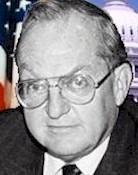
House Commerce and Judiciary Committees Vie for High Tech
Leadership
(June 15, 1999) There is a turf war in the House of Representatives between the House Commerce Committee and the House Judiciary Committee, and especially between their Telecommunications and Courts and Intellectual Property Subcommittees. The most recent battle is over database protection legislation, but the conflict extends into many other high-tech topics. The two sides perceive their missions quite differently, and respond to different constituencies. Hence, these turf contests will have profound consequences for high-tech policy.
|
Related Pages |
| Summary of Database
Protection Bills HR 1858 (Bliley - Commerce Bill) HR 354 (Coble - Judiciary Bill) Feist Publications v. Rural Tel. Ser. Lanham Act |
The Judiciary Committee's Subcommittee on Courts and Intellectual Property (CIP) has jurisdiction over intellectual property matters, including patent, trademark, and copyright law. It also deals with quasi intellectual property matters, such as the Lanham Act, which provides unfair trade practices causes of action for things such as trade dress infringement (Section 43a) and trademark dilution (Section 43c).
The CIP Subcommittee has been trying for several years to pass a bill to protect the developers of databases. The issue arose in 1991 when the Supreme Court ruled in Feist Publications v. Rural Telephone Service Co. that databases are not protected under copyright law. Moreover, the development of the Internet has made is database piracy much easier.
| News Analysis |
This has left database developers, who sometimes hire hundreds of workers to build the databases, with no legal recourse when others copy and republish the products of their labor.
The subcommittee then drafted legislation that gives a Lanham Act type of protection for databases. The bill currently pending in the House is HR 354, the Collections of Information Anti Piracy Act.
| Rep. Howard Coble, Chairman of the House Courts and Intellectual Property Subcommittee |  |
The CIP Subcommittee has routinely supported database protection bills. These bills have been sponsored by Rep. Howard Coble (R-NC). However, they have also been supported by Rep. Barney Frank (D-MA), who was Ranking Minority Member of the CIP Subcommittee in the 105th Congress, Rep. Howard Berman (D-CA), the current Ranking Member of the CIP Subcommittee, and other members of the CIP subcommittee.
In fact, HR 354 was passed by both the CIP Subcommittee and the full Judiciary Committee last month by unanimous voice votes. The same people who squabbled for months on live TV over the affairs of Bill Clinton handle intellectual property issues in a collegial, deliberative, and courteous manner, and reach bi-partisan consensus.
Rep. Coble's database protection bill in the 105th Congress, HR 2652, passed the House on May 19, 1998, by a voice vote. Also, the language of the bill was included in the Manager's Report on the Digital Millennium Act (HR 2281), which was approved by the House by a voice vote on August 4. However, it was taken out of the Conference Report which passed the Senate House and was signed by Bill Clinton.
 |
Rep. Tom Bliley, Chairman of the House Commerce Committee |
Just last month, the House Commerce Committee jumped into the fray, and offered its own bill, HR 1858, the Consumer and Investor Access to Information Act. Its sponsor is Rep. Tom Bliley (R-VA), Chairman of the Committee. Its cosponsors are Rep. Billy Tauzin (R-LA), the Chairman of the Telecommunications Subcommittee, Rep. John Dingell (D-MI), the Ranking Minority Member of the full Committee, Rep. Ed Markey (D-MA), the Ranking Minority Member of the Telecom Subcommittee, and other members of the Commerce Committee from both parties. This bill is vastly different from the Judiciary Committee bill. It all but denies databases developers protection from piracy.
Often, the major cleavages in Congress are partisan or ideological. Republicans or conservatives support one bill, while Democrats or liberals support another. In the case of database protection legislation, the major divide is between the two committees. Within each committee there is bipartisan consensus. There are reasons for this. The members of the two committees view the world differently. And, they have long worked with, and are responsive to, different groups.
For the CIP Subcommittee members, America leads the world economically and culturally because it has the most innovative and creative people and businesses. One of the main reasons Americans invent so much is that they are rewarded for creative efforts by legal protections of intellectual property. They get a property right in their inventions or other creations. The CIP Subcommittee members trace this notion back to the founding fathers, who wrote intellectual property rights into the Constitution.
|
Constitutional Authority While much of what the federal government does today is not mentioned in the Constitution, and was not envisioned by the founding fathers, both the Commerce Committee and the Courts and Intellectual Property Subcommittee trace their authority and jurisdiction back to the Constitution. Article I, Section 8, of the Constitution provides that: "Congress shall have Power ... To regulate Commerce with foreign Nations, and among the several States ... To promote the Progress of Science and useful Arts, by securing for limited Times to Authors and Inventors the exclusive Right to their respective Writings and Discoveries" The members of these committees take pride in fulfilling the original mission of the United States. |
The members of the CIP Subcommittee believe that they have a mission. It is their mission to see to it that as new technologies and industries evolve, and as new methods for theft appear, the laws are adjusted so that the creators of intellectual property have well defined property rights, and the legal recourse to adequately protect those rights. This means passing new laws, and creating new legal causes of action.
This provides jobs for Americans, increases prosperity, and makes America great.
The CIP subcommittee's constituency is also important. It consists primarily of intellectual property owners, businesses which service the intellectual property owners, the U.S. Patent and Trademark Office, and the unions which represent U.S.P.T.O. workers. This group includes such companies as Lexis-Nexus, Reed Elsevier, and Doan Agricultural Services, all of which produce major databases.
There is wide consensus within this constituency that strong intellectual property laws are a good thing, and that a database protection bill is needed. These are all people who depend on the protection of intellectual property, or at least observe the catastrophic effects when intellectual property protections are lacking.
Hence, when the CIP Subcommittee members observe a new type of intellectual property, or a new way for free riders to steal it, they go about finding ways to ensure that the creators can get a property right for a limited amount of time in their intellectual creation. They want to enact real incentives for people to innovate and create.
The members of the Commerce Committee live in a completely different world. They too want to assure a prosperous U.S. economy. They are no less patriotic. But they go about things altogether differently.
Many of the problems that the Commerce Committee deals with on a regular basis involve monopolies and bottlenecks in the economy, burdensome regulation by government bureaucracies, and frivolous and expensive class action lawsuits against high-tech companies. All of these reduce economic efficiency. This is especially the case for the Telecom Subcommittee, which has long been trying to end telecommunications monopolies, reduce the regulatory power of the Federal Communications Commission, bring down phone bills, and usher in a new broadband era.
The members of the Commerce Committee, and especially the Telecommunications Subcommittee, tend to see their mission as promoting free enterprise, and the marketplace. And they tend to go about this, not by creating new laws, and new rights, but by repealing laws, and restricting lawsuits.
Also, some of the Telecom Subcommittee's more active constituents are not intellectual property owners. They tend to be intellectual property consumers. Telecommunications companies, such as AT&T and MCI WorldCom, and Internet companies, such as Yahoo!, E-Trade, and Democracy.com, use the databases developed by others. They do not want to have to pay to license other people's databases. They do not want a database protection bill.
|
The Men on Both Committees Rep. Rick Boucher (D-VA) (web site | bio) sits on both the Telecom Subcommittee and the CIP Subcommittee. He is also one of the most knowledgeable Congressmen on technical and legal issues involving telecommunications and the Internet. At the Telecom Subcommittee hearing on June 15 he stated "I am very supportive of the approach that has been put forward by Chairman Bliley." However, he later said "I really have some questions about whether we need to legislate in this area at all." He also suggested taking a wait and see position. He was not present when the CIP Subcommittee approved HR 354. Rep. James Rogan (R-CA) (web site | bio) also sits on both subcommittees. He takes a more active role in protecting intellectual property rights. He was not present at the hearing on HR 1858. |
Hence, it is only natural for the Telecom Subcommittee to approach the database protection issue the same way it handles many other issues, and the way its constituents want it to, by leaving everything to the marketplace, and removing opportunities to bring lawsuits.
And so, the CIP Subcommittee produced a bill which will create new protections for database developers, and legal remedies to enforce them, including private rights of action. And its members, Republican and Democratic, stand behind the bill.
And, the Commerce Committee's Tom Bliley just introduced a bill which essentially does not create any meaningful protection for database developers, and does not create a private right of action (except in the case of real time financial data). And his fellow members, Republican and Democratic, are already lining up in support.
The outcome on this issue may depend on which committee's bill is taken up by full House. And on other high tech issues, the final outcome will depend significantly on which committee writes the legislation -- Commerce or Judiciary.
| Related Story: House Telecom Subcommittee Holds Hearing on Database Bill, 6/16/99. |
Today, the Commerce Committee has a very broad jurisdiction. This is due in part to the aggressive leadership of it former Chairman, Rep. John Dingell (D-MI), who led the Committee for 14 years. After the 1994 elections, he became the Ranking Minority Member. He actively fought to defend and expand its jurisdiction. More recently, Rep. Tom Bliley and Rep. Billy Tauzin have worked to consolidate the Committee's authority over the Internet, e-commerce, and other high-tech issues. It is perhaps ironic that just as the Commerce Committee fights to expand its jurisdiction from telecommunications to Internet and e-commerce, it is fighting to prevent the FCC from expanding its regulatory reach in the same direction.
In addition to the database protection issue, the CIP and Telecom Subcommittees have recently jousted over satellite TV bills, WIPO treaty implementation, and encryption.
Nor are turf battles between the CIP and Telecom Subcommittees new. The CIP Subcommittee has jurisdiction over defining what constitutes intellectual property. The Telecom Subcommittee has jurisdiction over communications media, including wireline, radio, television, cable, and satellite -- and now, apparently, the Internet. The jurisdictional problems tend to arise when intellectual property is broadcast or sent over a medium over which the Telecom Subcommittee has jurisdiction. For example, the Committees also conflicted over both the 1984 and 1992 cable bills.
Moreover, given the increasing complexity and ubiquity of converging communications and Internet technology, the size of the contested turf will continue to grow.
There are similar conflicts over jurisdiction in the Senate. There is also another issue that could become a major battleground between the Commerce and Judiciary Committees -- mergers and acquisitions of telephone, cable, satellite, Internet, software, and other companies of the converging world. Judiciary Committees have jurisdiction over antitrust law. But Commerce Committees have jurisdiction over the companies involved.